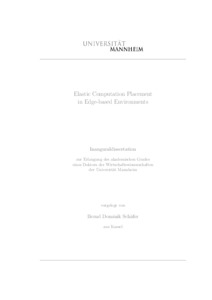|
Elastic computation placement in edge-based environments
Schäfer, Dominik
![[img]](https://madoc.bib.uni-mannheim.de/48832/1.hassmallThumbnailVersion/Dissertation_DominikSchaefer.pdf)  Vorschau |
|
PDF
Dissertation_DominikSchaefer.pdf
- Veröffentlichte Version
Download (2MB)
|
|
URL:
|
https://madoc.bib.uni-mannheim.de/48832
|
|
URN:
|
urn:nbn:de:bsz:180-madoc-488322
|
|
Dokumenttyp:
|
Dissertation
|
|
Erscheinungsjahr:
|
2019
|
|
Ort der Veröffentlichung:
|
Mannheim
|
|
Hochschule:
|
Universität Mannheim
|
|
Gutachter:
|
Becker, Christian
|
|
Datum der mündl. Prüfung:
|
7 Februar 2019
|
|
Sprache der Veröffentlichung:
|
Englisch
|
|
Einrichtung:
|
Fakultät für Betriebswirtschaftslehre > Wirtschaftsinformatik II (Becker 2006-2021)
|
|
Fachgebiet:
|
004 Informatik
|
|
Normierte Schlagwörter (SWD):
|
Edge Computing , Fog Computing , Middleware , Internet der Dinge , Kontextbezogenes System , Virtualisierung
|
|
Freie Schlagwörter (Englisch):
|
Distributed Computing Systems , Edge Computing , Fog Computing , Computation Placement , Computation Offloading , Task Migration , Workload Partitioning , Context-aware Computing , Middleware , Internet of Things , Virtualization
|
|
Abstract:
|
Today, technologies such as machine learning, virtual reality, and the Internet of Things are integrated in end-user applications more frequently. These technologies demand high computational capabilities. Especially mobile devices have limited resources in terms of execution performance and battery life. The offloading paradigm provides a solution to this problem and transfers computationally intensive parts of applications to more powerful resources, such as servers or cloud infrastructure. Recently, a new computation paradigm arose which exploits the huge amount of end-user devices in the modern computing landscape - called edge computing. These devices encompass smartphones, tablets, microcontrollers, and PCs. In edge computing, devices cooperate with each other while avoiding cloud infrastructure. Due to the proximity among the participating devices, the communication latencies for offloading are reduced. However, edge computing brings new challenges in form of device fluctuation, unreliability, and heterogeneity, which negatively affect the resource elasticity.
As a solution, this thesis proposes a computation placement framework that provides an abstraction for computation and resource elasticity in edge-based environments. The design is middleware-based, encompasses heterogeneous platforms, and supports easy integration of existing applications. It is composed of two parts: the Tasklet system and the edge support layer. The Tasklet system is a flexible framework for computation placement on heterogeneous resources. It introduces closed units of computation that can be tailored to generic applications. The edge support layer handles the characteristics of edge resources. It copes with fluctuation and unreliability by applying reactive and proactive task migration. Furthermore, the performance heterogeneity and the consequent bottlenecks are handled by two edge-specific task partitioning approaches. As a proof of concept, the thesis presents a fully-fledged prototype of the design, which is evaluated comprehensively in a real-world testbed. The evaluation shows that the design is able to substantially improve the resource elasticity in edge-based environments.
|
 | Dieser Eintrag ist Teil der Universitätsbibliographie. |
 | Das Dokument wird vom Publikationsserver der Universitätsbibliothek Mannheim bereitgestellt. |
 Suche Autoren in Suche Autoren in
Sie haben einen Fehler gefunden? Teilen Sie uns Ihren Korrekturwunsch bitte hier mit: E-Mail
Actions (login required)
 |
Eintrag anzeigen |
|
